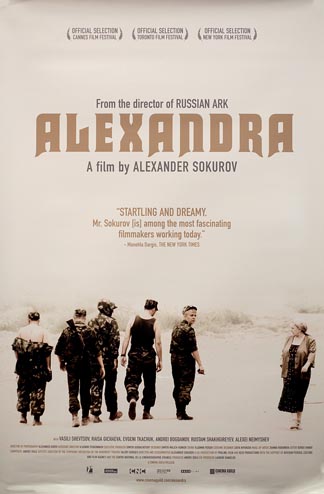
ALEXANDRA
Russia, 2007, 90 minutes, Colour.
Galina Vishnevskaya.
Directed by Aleksandr Sokurov.
In recent years, Sukurov has dramatised issues of power and politics in Germany and Japan as well as look at father son relationships. This time he explores power and possibilities for peace in Russia and in Chechnya where more than 60,000 locals lost their lives as well as 6000 Russian troops. The plot is basic. An old grandmother goes to visit her officer grandson in a peacekeeping camp. She is a forceful old lady, Alexandra (veteran actress, Galina Vishnevskaya), pushes her way around, sees and says what she wants, especially visiting the local people, the women.
Through Alexandra’s strong will and her eyes, we see the young recruits and their inexperience, their poor weaponry, the ugly conditions in a fairly barren countryside. While she tells her Chechnyan guide that war and peace are not simple issues, we know, with her, that there ought to be peace.
1.The work of Sokurov? Politics? Russia? Society, history?
2.The emphasis on Chechnya? The background of Chechnya’s place in Russian history, as part of Russia, as suffering from Stalin, the deportations after World War Two? Independence? The war in Chechnya? The Russian military occupation? Audience knowledge of this history – necessary or not?
3.The colour photography, drained? The atmosphere of desert? The dusty camp? The dusty town? Authentic atmosphere? The musical score?
4.The focus on Alexandra, her age? Getting permission to travel, getting out of the car, going to the train, the military escort? In the train, her arrival at the camp? Her age, experience? Her look, manner? A strong woman, strong minded?
5.Her going to visit her grandson? Not seeing him for seven years? The family bond? Meeting with him, the discussions, her admiration for him, her criticism of the military occupation? His exasperation with her wandering off? The bonds between the two and the impact of the visit?
6.The military camp, the physical appearance, the isolated soldiers, their conditions, sleeping quarters, eating quarters, hygiene? The dust? The guards, the isolation from the town?
7.The age of the recruits, very young, lacking experience? Seeing them at work? Denis supervising them? The repercussions for the Chechnyan population with having this kind of military occupation?
8.Alexandra, in the camp, getting lost, wandering around, meeting the men, observing them in their daily routines?
9.Her going beyond the camp, in the town, meeting the women, the discussions with them? The common humanity, enjoying their company? Their being Muslim, Chechnyan? The bonds between them all? Sending the young boy to guide her back to the camp, his never having travelled, the future of Chechnya?
10.Her return, the criticisms, her standing her ground? The farewell, her return journey?
11.The audience travelling with her, entering the camp with her, seeing Chechnya and the Chechnyans through her eyes? The change of attitude in her understanding? Audience understanding people better?
12.The contribution to Russian consciousness of a film like this? With the reputation of a director like Sokourov?